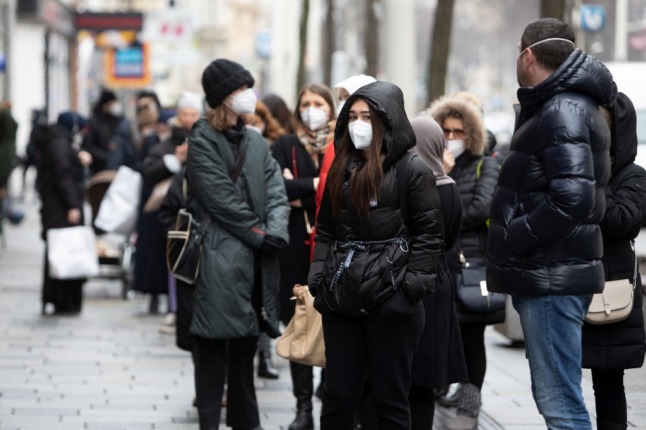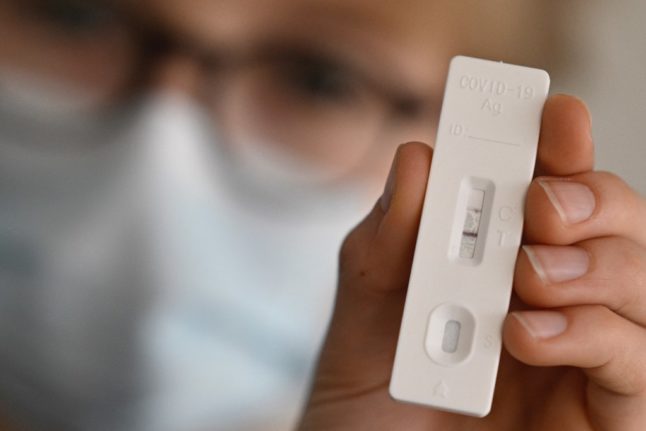Austria will remove the mandatory self-isolation requirement for people who test positive for Covid-19 from August 1st, Health Minister Johannes Rauch (Greens) said in a press conference on Tuesday.
People who do not feel sick will be allowed to leave their homes even after a positive Covid-19 test but will have to follow specific requirements, the Austrian federal government said.
“We believe we have a good balance now”, Rauch said.
The so-called “traffic restrictions” mean that those who don’t feel sick will be allowed to leave their homes but must wear an FFP2 mask indoors and outdoors whenever social distancing is not possible.
The health minister said that people who feel sick should call their doctors and ask for a sick leave.
Additionally, there are entry bans in hospitals, nursing and elderly care homes, childcare facilities, elementary schools and daycare centres.
READ ALSO: What are the fines for not wearing masks on Vienna’s public transport?
However, employees of these areas will be allowed to go to work – with the mask mandate – even if they are infected. The only exceptions are professions that are made impossible to do with a mask on, such as speech therapists and musicians.
The restrictions are valid for a maximum of 10 days and as soon as there is a positive antigen test. But a negative PCR test (or PCR test with a CT value over 30 as shown in the laboratory results) allows people to leave the “traffic restrictions” after the fifth day.
In the case of restaurants and bars, people are allowed to go inside, sit and chat but must wear a mask at all times – meaning they cannot consume food and beverages.
BACKGROUND: Will Austria drop quarantine and isolation for positive Covid-19 cases?
“We cannot live this degree of pandemic-related crisis mood for years”, health minister Johannes Rauch said. However, he added that if the situation appears to be getting worse again, the government will impose stricter measures.
He reiterated that the pandemic situation has reached a new stage. “We have the vaccine, we have medication, people are getting milder courses of the disease than before”, Rauch stated.
Protection for risk groups
Labour minister Martin Kocher (ÖVP) said risk groups should be protected, and a specific ordinance is being prepared for workplaces where there are people at risk.
Kocher said that companies will be able to work out measures such as work-from-home schemes for people at risk. Additionally, workers that belong to vulnerable groups could be exempted from work by presenting a “risk certificate”.
Experts sceptical
SPÖ health spokesperson Philip Kucher said that the government had abandoned the pandemic management, calling a lifting of isolation requirements “irresponsible and dangerous” and demanding a proper pandemic response plan for the autumn.
“A quarantine end for infected people would be dangerous and could bring the health care system back to its limits. An irresponsible and dangerous game”, he wrote in a statement.
READ ALSO: ‘At the limit: Huge spike in Covid hospitalisations and deaths in Austria
Austria’s federal government can set up the minimum requirements for the country, but individual states could impose stricter rules.
Vienna’s Mayor Michael Ludwig said he thought the relaxation was a “step in the wrong direction”, but if quarantine is abolished at a national level, the Austrian capital will not go a different way and keep quarantine, as it would be too difficult to implement with the city receiving 300,000 commuters every day.
Surprisingly the wife of Austria’s Health Minister Johannes Rauch has also criticised the plan to relax quarantine.
Gabi Sprickler-Falschlunger, the Vorarlberg SPÖ state party leader, says it is undoubtedly the “wrong decision” and predicts a sharp rise in Covid-19 infections.
Covid-19 numbers
On Tuesday, Austria recorded 9,213 new coronavirus cases after 125,571 PCR tests, according to the Health Ministry.
There were 1,604 people in hospitals with Covid-19, 56 more than the day before, and 93 in intensive care units (five more than the previous day).
Currently, just 60.2 percent of the population has valid immunological protection – meaning a combination of vaccines and/or recovered status accepted by the federal government.



 Please whitelist us to continue reading.
Please whitelist us to continue reading.
Member comments